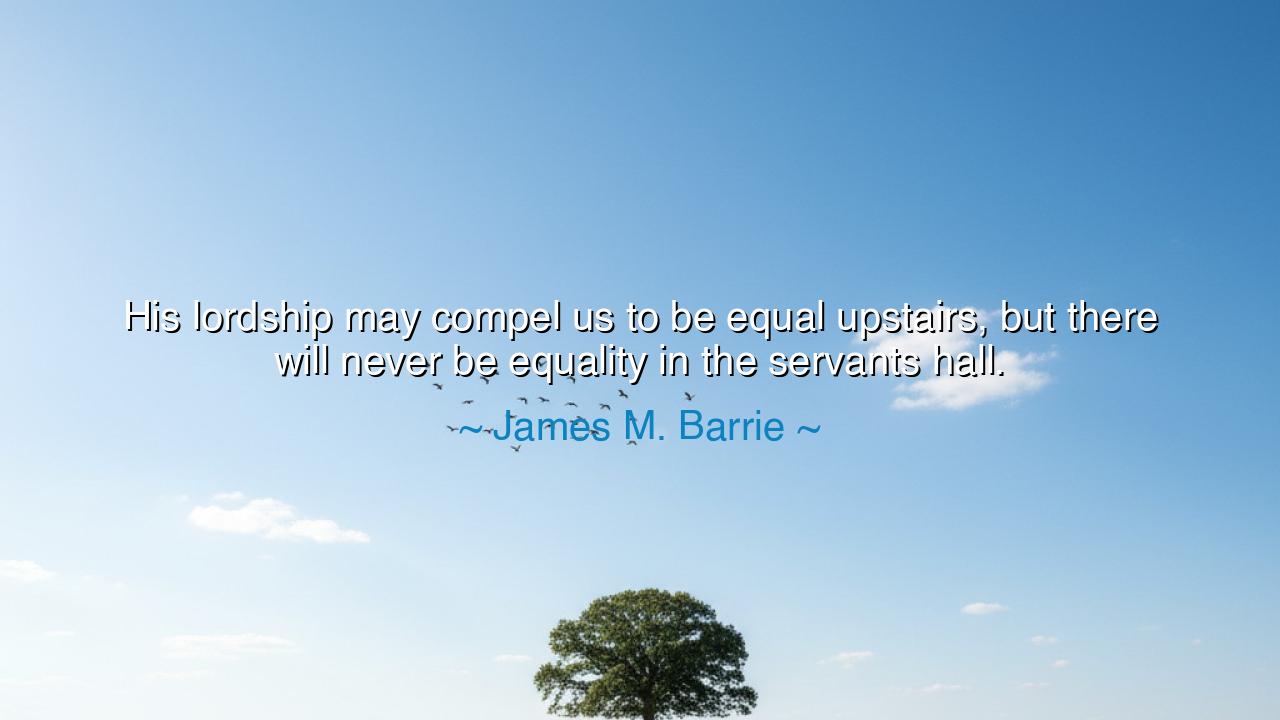
His lordship may compel us to be equal upstairs, but there will
His lordship may compel us to be equal upstairs, but there will never be equality in the servants hall.






The words of James M. Barrie—“His lordship may compel us to be equal upstairs, but there will never be equality in the servants hall”—carry with them the weight of centuries, and echo the hidden truths of human society. At first, the statement seems bound to the world of nobles and servants, of grand houses where lords dine in splendor while their attendants toil in shadows. Yet the wisdom within the phrase transcends its historical setting. It is not merely about social classes in the drawing rooms of Britain; it is about the unyielding nature of human pride, the silent hierarchies that cling to us, and the difficulty of achieving true equality when hearts are governed by envy, vanity, or disdain.
When Barrie speaks of being compelled to be equal “upstairs,” he refers to the outward rules imposed by the master of the house. The lord may command that all who dine in his presence share one table, that rank and station be set aside for the evening. Yet in the servants’ hall, far from the lord’s eye, another order emerges: maids compare their duties, butlers contest their dignity, footmen measure pride against one another. It is the reminder that no decree from above, however noble, can erase the subtle competitions of the human spirit. Authority can command appearances, but it cannot command the soul’s secret judgments.
History itself offers countless reflections of this truth. Consider the French Revolution, where the cry for liberty, equality, and fraternity thundered through the streets of Paris. The people toppled the throne, abolished titles, and declared all citizens equal before the law. Yet even among the revolutionaries, new factions rose: Girondins against Jacobins, moderates against radicals, each claiming greater purity, each scorning the other. Though crowns were shattered, the servants’ hall of society remained, where jealousy and pride sowed division. Equality written in law is fragile if the heart refuses to yield its own small tyrannies.
In this sense, Barrie’s words are a mirror, showing us that inequality is not only external, but internal. It lurks not only in gilded palaces but in the kitchens, the markets, the workshops, and even among friends. One servant may whisper, “I am better than she, for my duties are higher.” Another may sneer at the newcomer, seeking to preserve a fragile sense of worth. So it is in all gatherings of men and women: in schools, in offices, in nations. The struggle for place never sleeps.
Yet let us not despair. The ancients teach us that the battlefield of the heart is where the noblest victories may be won. If we cannot abolish hierarchy from the world, we can soften its edge within ourselves. Consider the example of Abraham Lincoln, who though elevated to the highest seat of power, never scorned the humblest. He greeted soldiers by name, listened to their stories, and bowed his head with them in sorrow. In his presence, equality was not merely a decree, but a living spirit. He proved that when humility and compassion reign within, the servants’ hall can become a place of fellowship rather than rivalry.
Thus the lesson is clear: true equality does not begin “upstairs” where laws are spoken, but in the hidden chambers of the heart. One may be compelled to act with fairness by rule or by law, but to live equality requires the greater courage of humility. It is to resist the whisper of comparison, to see not the servant nor the master, but the fellow human. The measure of greatness is not in rising above others, but in lifting others beside us.
So, my children, if you would learn from Barrie’s truth, let your actions be these: speak gently even to the lowliest, for no soul is low before the eyes of eternity. Refuse the poison of envy, for it shackles you more tightly than any chain. In your homes, in your labors, in your friendships, banish the secret hierarchies of pride. And when you gather in your own servants’ hall, whether it be workplace, school, or circle of kin, strive to be the one who brings warmth, not rivalry; kinship, not contempt.
For though the lord may compel fairness “upstairs,” only you may kindle it within. The battle is eternal, but so too is the triumph of love over pride. And in that triumph, there lies the only equality that no master, no hall, no kingdom can ever take away.






AAdministratorAdministrator
Welcome, honored guests. Please leave a comment, we will respond soon